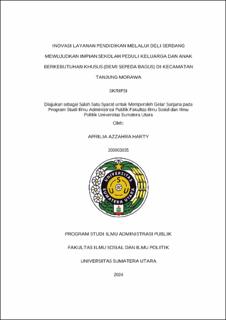Inovasi Layanan Pendidikan melalui Deli Serdang Mewujudkan Impian Sekolah Peduli Keluarga dan Anak Berkebutuhan Khusus (Demi Sepeda Bagus) di Kecamatan Tanjung Morawa
Innovation of Educational Services through Deli Serdang Realizing the Dream of A School that Cares for Families and Children with Special Needs (Demi Sepeda Bagus) in Tanjung Morawa District

Date
2024Author
Harty, Aprilia Azzahra
Advisor(s)
Siahaan, Asima Yanty Sylvania
Metadata
Show full item recordAbstract
Education is a right for every Indonesian citizen. Education for Children with Special Needs is a right granted by the government without discriminating against the rights of every citizen, without discrimination and without labeling. Tanjung Morawa District is the only sub-district that has 2 Community Learning Activity Centers (PKBM) providing education for Children with Special Needs in Deli Serdang Regency. Demi Bagus Bicycles is here as a solution for equal distribution of educational services for Children with Special Needs in Deli Serdang Regency. This research aims to describe educational service innovations through the Deli Serdang Realizing the Dream of a School that Cares for Families and Children with Special Needs (Demi Sepeda Bagus) in Tanjung Morawa District.
The research method used in this research is qualitative using a descriptive approach. The data sources used are Primary Data and Secondary Data. Data collection was carried out using interview techniques, observation, documentation and literature. The data obtained was then analyzed qualitatively using a theoretical approach according to Rogers (2003) with 5 variables including Relative Advantage, Compatibility, Complexity, Triability and Observability.
The research results show that the Innovation in Educational Services through the Deli Serdang Realizing the Dream of a School that Cares for Families and Children with Special Needs (Demi Sepeda Bagus) is a renewal of effective and efficient educational services. The implementation of the Demi Good Bicycle innovation in Tanjung Morawa District can be said to have gone well, bringing many benefits to Children with Special Needs, parents and PKBM parties. This can be seen from the five indicators in the innovation attribute theory, only in the complexity indicator there are still obstacles related to the lack of special tutors who teach sign language for children with special needs at Community Learning Activity Centers (PKBM), as well as the existence of people who still do not understand about the existence of this innovation as a solution for ABK education services. So there is a need for socialization carried out by every regional apparatus, both in villages and sub-districts.
Collections
- Undergraduate Theses [1938]
